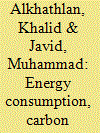| Srl | Item |
| 1 |
ID:
126827


|
|
|
|
|
| Publication |
2014.
|
| Summary/Abstract |
We analyze oil export behavior by Saudi Arabia and the Rest of OPEC since 1973. In the literature there has been a wide range of estimates of their correlation: from positive, to zero, to negative. We find that the correlation has varied over time, from moderately high (0.7) in normal periods, to negative during each of five interruptions; the average correlation has been 0.19. Saudi Arabia's oil market behavior depends upon circumstances, but its primary goal is the stability of OPEC and the world oil market. It will coordinate export reductions with the Rest of OPEC when faced with declining demand, but it will increase exports when faced with interruptions elsewhere in OPEC. Allowing for such differences provides evidence of intelligent, context-dependent consistency. But ignoring context - by wrongly assuming the same Saudi response in Normal periods and Interruptions - can lead to a conclusion of Saudi "inconsistency" because the difference in the responses has been obscured.
|
|
|
|
|
|
|
|
|
|
|
|
|
|
|
|
| 2 |
ID:
125867


|
|
|
|
|
| Publication |
2013.
|
| Summary/Abstract |
The objective of this study is to examine the relationship among economic growth, carbon emissions and energy consumption at the aggregate and disaggregate levels. For the aggregate energy consumption model, we use total energy consumption per capita and CO2 emissions per capita based on the total energy consumption. For the disaggregate analysis, we used oil, gas and electricity consumption models along with their respective CO2 emissions. The long-term income elasticities of carbon emissions in three of the four models are positive and higher than their estimated short-term income elasticities. These results suggest that carbon emissions increase with the increase in per capita income which supports the belief that there is a monotonically increasing relationship between per capita carbon emissions and per capita income for the aggregate model and for the oil and electricity consumption models. The long- and short-term income elasticities of carbon emissions are negative for the gas consumption model. This result indicates that if the Saudi Arabian economy switched from oil to gas consumption, then an increase in per capita income would reduce carbon emissions. The results also suggest that electricity is less polluting than other sources of energy.
|
|
|
|
|
|
|
|
|
|
|
|
|
|
|
|